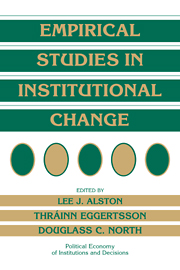Book contents
- Frontmatter
- Contents
- List of contributors
- Series editors' preface
- Acknowledgments
- Introduction
- A note on the economics of institutions
- Empirical work in institutional economics: an overview
- 1 Toward an understanding of property rights
- Economic variables and the development of the law: the case of western mineral rights
- 2 Impediments to institutional change in the former Soviet system
- Why economic reforms fail in the Soviet system: a property rights–based approach
- 3 Transaction costs and economic development
- Public institutions and private transactions: a comparative analysis of the legal and regulatory environment for business transactions in Brazil and Chile
- 4 The evolution of modern institutions of growth
- Constitutions and commitment: the evolution of institutions governing public choice in seventeenth-century England
- 5 Regulation in a dynamic setting
- The political economy of controls: American sugar
- 6 Price controls, property rights, and institutional change
- Roofs or stars: the stated intents and actual effects of a rents ordinance
- 7 Regulating natural resources: the evolution of perverse property rights
- Legally induced technical regress in the Washington salmon fishery
- 8 The politics of institutional change in a representative democracy
- A political theory of the origin of property rights: airport slots
- 9 The economics and politics of institutional change
- Paternalism in agricultural labor contracts in the U.S. South: implications for the growth of the welfare state
- Epilogue: economic performance through time
- Author index
- Subject index
- POLITICAL ECONOMY OF INSTITUTIONS AND DECISIONS
A political theory of the origin of property rights: airport slots
Published online by Cambridge University Press: 05 June 2012
- Frontmatter
- Contents
- List of contributors
- Series editors' preface
- Acknowledgments
- Introduction
- A note on the economics of institutions
- Empirical work in institutional economics: an overview
- 1 Toward an understanding of property rights
- Economic variables and the development of the law: the case of western mineral rights
- 2 Impediments to institutional change in the former Soviet system
- Why economic reforms fail in the Soviet system: a property rights–based approach
- 3 Transaction costs and economic development
- Public institutions and private transactions: a comparative analysis of the legal and regulatory environment for business transactions in Brazil and Chile
- 4 The evolution of modern institutions of growth
- Constitutions and commitment: the evolution of institutions governing public choice in seventeenth-century England
- 5 Regulation in a dynamic setting
- The political economy of controls: American sugar
- 6 Price controls, property rights, and institutional change
- Roofs or stars: the stated intents and actual effects of a rents ordinance
- 7 Regulating natural resources: the evolution of perverse property rights
- Legally induced technical regress in the Washington salmon fishery
- 8 The politics of institutional change in a representative democracy
- A political theory of the origin of property rights: airport slots
- 9 The economics and politics of institutional change
- Paternalism in agricultural labor contracts in the U.S. South: implications for the growth of the welfare state
- Epilogue: economic performance through time
- Author index
- Subject index
- POLITICAL ECONOMY OF INSTITUTIONS AND DECISIONS
Summary
Property rights enable private persons or groups to control resources that might otherwise be controlled politically. That these rights (to use, sell, rent, profit from, and exclude others from) exist and are recognized means that rulers allow persons other than themselves to exercise control over valuables. In the abstract this is a puzzling fact. Why should rulers, with their supposed monopoly of force, leave great treasure in hands other than their own? Yet they do, and, presumably, they have good reason to do so. To identify their reason is to provide a partial explanation, at least, of the origin of property rights.
Traditional justifications of property rights ordinarily include some reference to origins. Unfortunately, many descriptions of origins devised for justificatory purposes are not historically or scientifically convincing and thereby weaken the justifications. To remedy this weakness, we set forth a positive explanation of rulers' motivations to grant property rights and citizens' motivations to petition for them and to respect them. We illustrate our theory with a contemporary example so that it, unlike most other discussions of origins, can be checked against easily available detail.
But first a caveat. Our purpose is not to debate the philosophical justification of rights. We recognize, of course, that despite our self-imposed restrictions, our theory may have implications for these justifications that depend crucially on incomplete descriptions of origins.
- Type
- Chapter
- Information
- Empirical Studies in Institutional Change , pp. 283 - 303Publisher: Cambridge University PressPrint publication year: 1996
- 3
- Cited by



